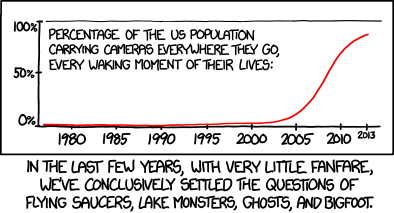July 9, 2013
Sometimes absence of evidence is evidence of absence
From XKCD

Thomas Lumley (@tslumley) is Professor of Biostatistics at the University of Auckland. His research interests include semiparametric models, survey sampling, statistical computing, foundations of statistics, and whatever methodological problems his medical collaborators come up with. He also blogs at Biased and Inefficient See all posts by Thomas Lumley »
Haha.
The catch phrase about absence of evidence has always annoyed me, because it’s obviously false.
12 years ago
Yes, but it’s relatively interestingly false — the question of how strongly you should believe in something based on purely negative circumstantial evidence is a complicated one.
We had a homework question once in stats theory along the lines “You have some sugar packets with pictures of birds. There are two with robins, one with a blue jay, and one with a cardinal. What’s the probability that the next one you see will have a mockingbird?”
12 years ago
“Yes, but it’s relatively interestingly false — the question of how strongly you should believe in something based on purely negative circumstantial evidence is a complicated one.”
Definitely, but you’d have to make some pretty weird assumptions to make “absence of evidence” support the hypothesis of presence, or be neutral about it. Usually it will support the absence hypothesis, although sometimes it will only support it a little bit.
12 years ago
On a loosely related note, apparently as a small child I had arrived from empirical data at the proposition “all swans are black”. We then went to Canada, “Look, Mummy, white swans”.
I must have been aware of white swans in stories, but I may have classified them with other fantasy creatures.
12 years ago
Isn’t the point that in this case the amount of evidence has gone through the roof?
12 years ago